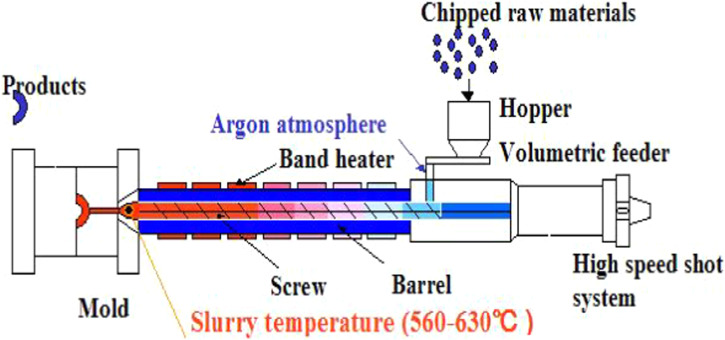Introduction
Finding innovative and efficient processes is crucial to stay competitive. One such process that has been gaining traction is squeeze casting. Squeeze casting combines the advantages of both casting and forging, resulting in high-quality, near-net-shaped components. This article will delve into the intricacies of squeeze casting and explore how it is revolutionizing the manufacturing industry.
Understanding Squeeze Casting
Squeeze casting, also known as liquid metal forging, is a manufacturing process that involves injecting molten metal into a preheated die cavity under high pressure. The molten metal is then subjected to a controlled solidification process while simultaneously applying pressure. This unique combination of pressure and solidification results in a dense, high-integrity product with improved mechanical properties.
The Process
Squeeze casting begins with melting the metal alloy to its liquid state. The liquid metal is then injected into a preheated die cavity, usually made of steel, using a high-pressure mechanism. The die cavity is designed to have the desired shape and dimensions of the final component.
As the molten metal enters the die, pressure is applied to compact it, ensuring proper filling and reducing the formation of defects. The pressure is maintained until the metal solidifies, preventing porosity and improving the mechanical properties of the final product.
Benefits of Squeeze Casting
Squeeze casting offers several advantages over traditional casting and forging processes. Firstly, it enables the production of near-net-shaped components, reducing the need for secondary machining operations. This not only saves time but also minimizes material wastage.
Secondly, squeeze casting improves the mechanical properties of the components. The application of pressure during solidification eliminates voids and reduces porosity, resulting in components with enhanced strength, fatigue resistance, and dimensional stability.
Additionally, squeeze casting allows for the production of complex geometries and thin-walled structures that are not feasible with other manufacturing methods. The process ensures excellent surface finish and precise dimensional accuracy, meeting the stringent requirements of various industries, including aerospace, automotive, and defense.
Εφαρμογές
Squeeze casting finds application in a wide range of industries, primarily those that require high-performance components. The aerospace industry, for example, utilizes squeeze casting to manufacture turbine blades, engine components, and structural parts. The automotive industry benefits from squeeze casting by producing lightweight, high-strength components such as suspension parts, engine blocks, and cylinder heads.
Other notable applications of squeeze casting include the production of power transmission components, medical implants, and various industrial machinery parts. The versatility and quality of squeeze cast components make them highly sought after in industries where precision, strength, and reliability are of utmost importance.

Future Prospects
As the manufacturing industry continues to evolve, squeeze casting is expected to play a crucial role in meeting the demands for high-quality components. With ongoing advancements in materials science and technology, the process is likely to become even more efficient and cost-effective.
Research and development efforts are focusing on expanding the range of alloys that can be processed through squeeze casting, exploring new applications, and optimizing the process parameters to further enhance the mechanical properties of the components.
Conclusion
Squeeze casting is undoubtedly revolutionizing the manufacturing industry. This unique process combines the advantages of casting and forging, offering near-net-shaped components with improved mechanical properties. The benefits of squeeze casting, including reduced material wastage, enhanced strength, and complex geometry capabilities, make it an attractive choice for several industries.
As the demand for high-quality components continues to grow, squeeze casting is expected to become a widely adopted manufacturing process. Its ability to produce near-net-shaped components with exceptional mechanical properties will undoubtedly drive innovation and propel the manufacturing industry forward.
-

- Κάλυμμα περιβλήματος φορητού υπολογιστή Γ
-

- Factory Custom China Bmx Cycles Road Sport Kids Bicycle 12 16 18 20 Inches Cycle Mtb For Kids 6-10 Years
-

- Περίβλημα ελεγκτή ανταλλακτικών αυτοκινήτων με χύτευση από κράμα μαγνησίου
-

- Μεταλλικά φρένα Thixomolding με χύτευση από κράμα μαγγενίου
-

- Τροχός ποδηλάτου εξαρτημάτων χυτηρίου από κράμα μαγνησίου με κατεργασία CNC & φινίρισμα επιφανειών
-

- ανταλλακτικά και εξαρτήματα για πιρούνι ανάρτησης ποδηλάτου για MTB

 0086-750-5616188
0086-750-5616188 +86 13392089688
+86 13392089688 sales@zhongmei-tech.com
sales@zhongmei-tech.com







